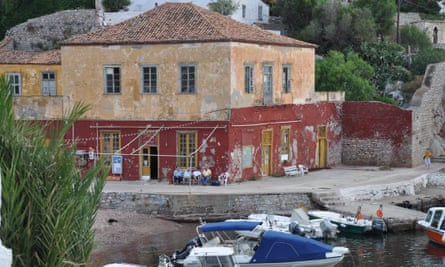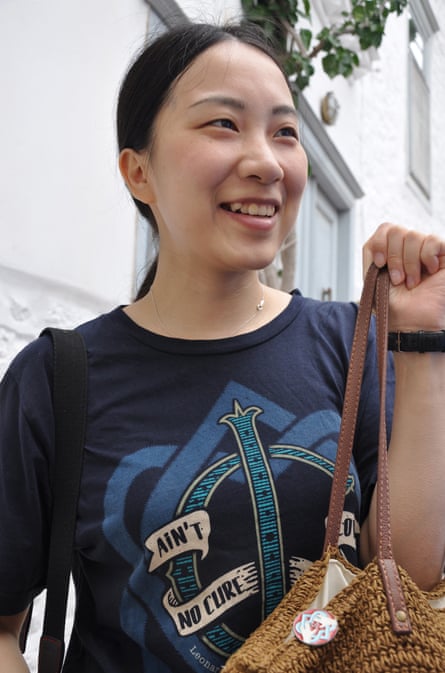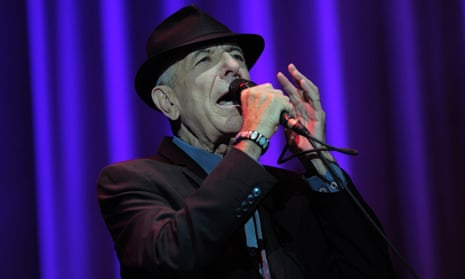A round of applause broke out when the barman at the Roloi cafe hoisted a small red and white flag over the waterfront taverna – the unified heart symbol that the Canadian songwriter Leonard Cohen used on the cover of one of his early poetry collections.
The first tourists of the season, a dozen at most, were gathered beneath it on the Greek island of Hydra where Cohen, who was yet to soar to fame as one of the most lyrical songwriters of his generation, arrived in 1960 to work on his poetry and novels.
This small group of travellers had not arrived at the Roloi by chance. Within the next few days, another 200 would join them on a kind of pilgrimage to this island beloved by the singer, who died last November.
One by one or in small groups, some with guitars slung over their shoulders, they made their way to the island from Japan, Holland and Australia, from Canada, Germany and Ireland, from Britain, Lithuania, France, from the US, and above all from Finland.
That is because the gathering – their eighth on the island since 2002 – was organised by Cohen’s biggest fan club, the Leonard Cohen Forum, which is run out of a small brick house in a suburb of Helsinki.

That is where Jarkko Arjatsalo, teaching himself how to make a website back in 1995, decided to fill the gap left by a defunct English fanzine by creating a site for Cohen. No one was more surprised than Arjatsalo when, two years later, an email landed from Cohen himself.
“In 1997, he emailed from the Buddhist retreat at Mount Baldy and asked, if he sent us material, would we put it up on the site,” said Arjatsalo, a retired accountant. “Well, you can guess what the answer was.”
The first item to arrive in Finland was the manuscript of the song Suzanne, one of the most famous in the songwriter’s repertoire. More followed. In all, Cohen sent 20 manuscripts and 50 drawings, said Arjatsalo, who wears a silver ring given to him by the musician he met more than 40 times.
Cohen was 26 when he arrived on Hydra in 1960, joining a small group of expatriate artists who had moved there when the port consisted of four coffee houses and a taverna. Water was delivered by donkey and homes were lit by kerosene or oil.
Using a $1,500 bequest from his grandmother, Cohen purchased an old stone house without running water, plumbing or electricity. There, Cohen worked on his poetry and novels in the garden, swam in the afternoons, and met up with the Australian writers George Johnston and Charmian Clift at the Roloi – which at the time was a grocery store called Katsikas with a handful of tables out the front.
“The years are flying past and we all waste so much time wondering if we dare to do this or that,” Cohen said of his decision to buy the house, according to his Canadian-American biographer, Ira B Nadel. “The thing is to leap, to try, to take a chance.”
For Cohen, who at this time considered himself a writer rather than a musician, it was a productive period. During roughly seven years on Hydra he wrote a controversial poetry collection titled Flowers for Hitler; his first novel, The Favourite Game; and a book about religion and sexuality called Beautiful Losers.

It was also on Hydra that Cohen fell in love with Marianne Ihlen, the beautiful Norwegian woman who became his muse and was later immortalised in his ballad, So Long, Marianne.
Recognising each other by their united-heart pendants, their penned-on heart tattoos, or their concert T-shirts, the fans gathered over four days at various locations of Cohen-related significance. They include Cohen’s walled house that still stands in the town; the peeling russet-and-yellow taverna at Kamini, where he used to meet with friends; and the tree outside Douskos’s taverna, where a famous 1960 photograph shows Cohen playing guitar with his friends.
Those who have been before share Cohen stories with first-timers who have come in greater numbers this year compared to two years ago.
Régine Spindler, a retired school teacher from the French town of Thionville, Alsace, met the singer twice, at 18 and again at 22, by travelling to his concerts and chatting to his technicians. When she heard of the artist’s death, she said: “I couldn’t cry then, but now, being here …”
Hafid Gafaïti, an Algerian-American literature professor and a fan since the 1970s, met Cohen four times on Buddhist retreats and says he still cannot play his last CD.

Meanwhile, Wan Yan Qian, 30, a Chinese bank official who works in Japan, is the youngest fan to have travelled to Hydra for this event. She owns two Cohen albums though she has no turntable to play them on, having fallen for his music as a student. “It’s his older voice, the music … it got me,” she said. “It’s impossible he will do no more tours.”
German singers Claudia Rucker and Ben Leinenbach performed 23 Cohen songs on a restaurant terrace near Cohen’s house. There were guitar-strummings on the waterfront and spontaneous singalongs at the Roloi that lasted until dawn. To accommodate the large number of fans this year, the film of one of his concerts had to be programmed twice at Hydra’s open-air cinema that has been run by Lakis Christides since Cohen’s day.
Among the small spontaneous acts of commemoration, more public ones took place. On Saturday, the municipality renamed a street in the songwriter’s honour. And 400 fans crowdfunded the construction of a wide stone bench overlooking the sea that was inaugurated, at last, the same day.
“It was supposed to be a present for Cohen’s 80th birthday, but now it is dedicated to his memory,” said Arjatsalo wistfully, standing in the late afternoon sun at a ceremony in which the seat was formally presented to the island.
Rucker performed A Bench Above the Ocean, which she composed on the island two days earlier, and German guitarist Gerard George Kettel performed Bird on the Wire, the most emblematic song linking Cohen to Hydra. Cohen wrote it on returning to his house to discover an electricity cable now running outside his window. The telephone service had arrived.
A moment of silence, interrupted only by the chugging of a boat and the shouts of children, was held before Arjatsalo, Christides and the mayor of Hydra, each with a set of scissors, cut the aqua ribbon across the bench.
Then Arjatsalo read a message that Cohen had sent him after he learnt about the plans for the Hydra bench. “I bow my head in gratitude,” he wrote. “Dear friends, thank you for the countless times you have lifted my spirit, thank you for the comfort and encouragement. Love and blessings, Leonard.”

Comments (…)
Sign in or create your Guardian account to join the discussion